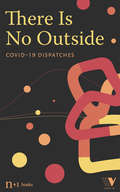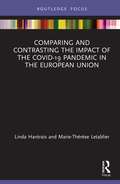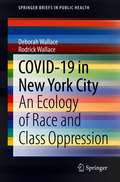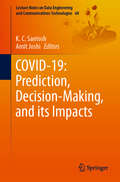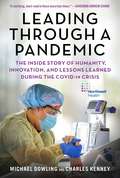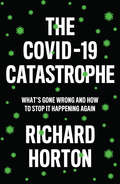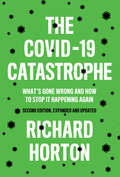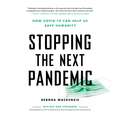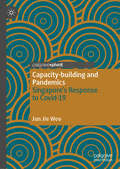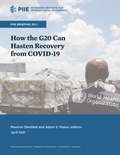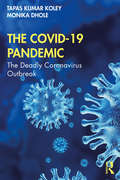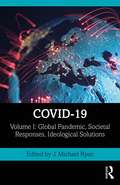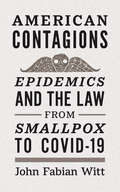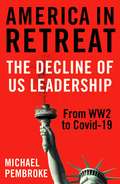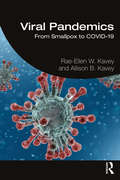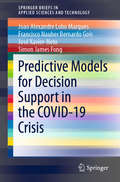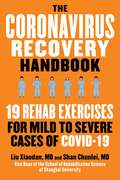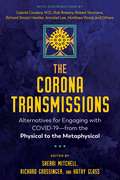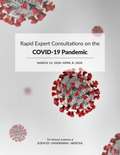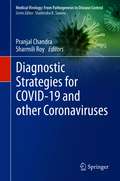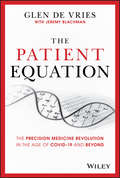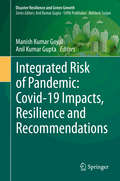Special Collections
Everything you ever wanted to know about the COVID-19 pandemic
- Table View
- List View
There Is No Outside
by Verso BooksAn urgent collection of essays on the global pandemic, from n+1 and Verso Books
A collaboration between the renowned magazine of literature and politics, n+1, and Verso Books, this collection tracks the course of Covid-19 across the circuits of global capital to New York&’s prisons and emergency rooms, Los Angeles&’s homeless encampments, and the migrant camps in Greece; and into the intimate spaces of our homes, our ideas of how to live, and into our bodies and cells.
We hear from sex workers without work and sailors quarantined on their ships, witness the pandemic from the quiet devastation of upstate New York and quarantined Rome as well as the streets of Delhi, Kashmir, and London and the emergency room of a New York City hospital. From some of the most exciting and thoughtful young writers around the globe, There Is No Outside explores the unspooling wreckage of Covid-19 and helps us on what might come in the aftermath.
With contributions from Andrew Liu, Rachel Ossip, Gabriel Winant, Francesco Pacifico, Sarah Resnick, Teresa Thornhill, Shigraf Zahbi, Debjani Bhattacharyya, Banu Subramaniam, Mark Krotov, Karim Sariahmed, Ana Cecilia Alvarez, Jack Norton, Laleh Khalili, Aaron Timms, Sonya Aragon, Sean Cooper, Chloe Aridjis, and Marco Roth, and with an introduction by Jessie Kindig.
Comparing and Contrasting the Impact of the COVID-19 Pandemic in the European Union
by Linda Hantrais and Marie-Thérèse LetablierComparing and Contrasting the Impact of the COVID-19 Pandemic in the European Union challenges the use of uncontextualised comparisons of COVID-19 cases and deaths in member states during the period when Europe was the epicentre of the pandemic. This timely study looks behind the headlines and the statistics to demonstrate the value for knowledge exchange and policy learning of comparisons that are founded on an in-depth understanding of key socio-demographic and public health indicators within their policy settings. The book adopts innovative, integrated, multi-disciplinary international perspectives to track and assess a fast-moving topical subject in an accessible format. It offers a template for analysing policy responses to the COVID-19 pandemic and for using evidence-based comparisons to inform and support policy development.
COVID-19 in New York City
by Rodrick Wallace and Deborah WallaceThis book is the first social epidemiological study of COVID-19 spread in New York City (NYC), the primary epicenter of the United States. New York City spread COVID-19 throughout the United States. The context of epicenter formation determined the rapid, extreme rise of NYC case and mortality rates. Decades of public policies destructive of poor neighborhoods of color heavily determined the spread within the City. Premature mortality rates revealed the "weathering" of policy-targeted communities: accelerated aging due to chronic stress. COVID attacks the elderly more severely than those under the age of 60. Communities with high proportions of prematurely aged residents proved fertile ground for COVID illness and mortality. The very public policies that created swaths of white wealth across much of Manhattan and parts of Brooklyn destroyed the human diversity needed to ride out crises. Topics covered within the chapters include: Premature Death Rate Geography in New York City: Implications for COVID-19 NYC COVID Markers at the ZIP Code Level Prospero's New Castles: COVID Infection and Premature Mortality in the NY Metro Region Pandemic Firefighting vs. Pandemic Fire Prevention Conclusion: Scales of Time in Disasters An exemplary study in health disparities, COVID-19 in New York City: An Ecology of Race and Class Oppression is essential reading for social epidemiologists, public health researchers of health disparities, those in public service tasked with addressing these problems, and infectious disease scientists who focus on spread in human populations of new zoonotic diseases. The brief also should appeal to students in these fields, civil rights scholars, science writers, medical anthropologists and sociologists, medical and public health historians, public health economists, and public policy scientists.
COVID-19: Prediction, Decision-Making, and its Impacts
by Amit Joshi and K. C. SantoshThis book outlines artificial intelligence for COVID-19 issues that are ranging from prediction to decision-making for healthcare support in human lives. Starting with major COVID-19 issues and challenges, it takes possible AI-based solutions for multiple problems, such as early prediction, its role for public health, detection of positive cases, drug analysis, and healthcare support. It mainly employs publicly available data (population) to predict who should be tested for COVID-19, for example, radiological image data to detect COVID-19 positive cases from other similar and/or different manifestations, such as pneumonia, distributed healthcare support, and supply chains in the middle of COVID-19 pandemic. The book includes recently developed AI-driven tools and techniques, such as pattern recognition, anomaly detection, machine learning, and data analytics. It covers a wide range of audience from computer science and engineering to healthcare professionals.
Leading Through a Pandemic
by Charles Kenney and Michael J. Dowling"A clarifying must-read in these uncertain times.&” —GOVERNOR ANDREW CUOMO Journey behind the front lines of the coronavirus pandemic with Northwell Health, New York&’s largest health system. What was it like at the epicenter, inside the health system that cared for more COVID-19 patients than any other in the United States? Leading Through a Pandemic: The Inside Story of Lessons Learned about Innovation, Leadership, and Humanity During the COVID-19Crisis takes readers inside Northwell Health, New York&’s largest health system. From the C-suite to the front lines, the book reports on groundwork that positioned Northwell as uniquely prepared for the pandemic. Two decades ago, Northwell leaders began preparing for disasters—floods, hurricanes, blackouts, viruses, and more based on the belief that "bad things will happen and we have to be ready." Following a course highly unusual for an American health system, Northwell developed one of the most advanced non-government emergency response systems in the country. Northwell reached a point where leaders could confidently say "we are comfortable being uncomfortable in a crisis." But even with sustained preparation, the pandemic stands as a singularly humbling experience. Leading Through a Pandemic offers guidance on how hospitals and health systems throughout the country can prepare more effectively for the next viral threat. The book includes dramatic stories from the front lines at the peak of the viral assault and lessons of what went well, and what did not. The authors draw upon the Northwell experience to prescribe changes in the health care system for next time. Beyond the obvious need for increased stockpiles of supplies and equipment is the far more challenging task of fundamentally changing the culture of American health care to embrace a more robust emergency response capability in hospitals and systems of all sizes across the nation. The book is a must read for health care professionals, policy-makers, journalists, and readers whose curiosity demands a deeper dive into the surreal realm of the coronavirus pandemic.
The COVID-19 Catastrophe
by Richard HortonThe global response to the Covid-19 pandemic is the greatest science policy failure in a generation. We knew this was coming. Warnings about the threat of a new pandemic have been made repeatedly since the 1980s and it was clear in January that a dangerous new virus was causing a devastating human tragedy in China. And yet the world ignored the warnings. Why?In this short and hard-hitting book, Richard Horton, editor of the medical journal The Lancet, scrutinizes the actions that governments around the world took – and failed to take – as the virus spread from its origins in Wuhan to the global pandemic that it is today. He shows that many Western governments and their scientific advisors made assumptions about the virus and its lethality that turned out to be mistaken. Valuable time was lost while the virus spread unchecked, leaving health systems unprepared for the avalanche of infections that followed. Drawing on his own scientific and medical expertise, Horton outlines the measures that need to be put in place, at both national and international levels, to prevent this kind of catastrophe from happening again. We’re supposed to be living in an era where human beings have become the dominant influence on the environment, but Covid-19 has revealed the fragility of our societies and the speed with which our systems can come crashing down. We need to learn the lessons of this pandemic and we need to learn them fast because the next pandemic may arrive sooner than we think.
The COVID-19 Catastrophe
by Richard HortonThis expanded, updated, and completely revised edition of The COVID-19 Catastrophe is the authoritative guide to a global health crisis that has consumed the world. Richard Horton, editor of the medical journal The Lancet, scrutinises the actions taken by governments as they sought to contain the novel coronavirus. He shows that indecision and disregard for scientific evidence has led many political leaders to preside over hundreds of thousands of needless deaths and the worst global economic crisis for three centuries. This new edition provides a systematic discussion of the pandemic’s course, national responses, more transmissible mutant variants of the virus, and the launch of the world’s largest ever vaccination programme. Only now are we beginning to understand the full scale of the COVID-19 crisis. We need to learn the lessons of this pandemic, and we need to learn them fast, because the next pandemic may arrive sooner than we think.
COVID-19
by Debora MacKenzieIn a gripping, accessible narrative, a veteran science journalist lays out the shocking story of how the COVID-19 coronavirus pandemic happened and how to make sure this never happens againOver the last 30 years of epidemics and pandemics, we learned nearly every lesson needed to stop this coronavirus outbreak in its tracks. We heeded almost none of them. The result is a pandemic on a scale never before seen in our lifetimes. In this captivating, authoritative, and eye-opening book, science journalist Debora MacKenzie lays out the full story of how and why it happened: the previous viruses that should have prepared us, the shocking public health failures that paved the way, the failure to contain the outbreak, and most importantly, what we must do to prevent future pandemics.Debora MacKenzie has been reporting on emerging diseases for more than three decades, and she draws on that experience to explain how COVID-19 went from a potentially manageable outbreak to a global pandemic. Offering a compelling history of the most significant recent outbreaks, including SARS, MERS, H1N1, Zika, and Ebola, she gives a crash course in Epidemiology 101--how viruses spread and how pandemics end--and outlines the lessons we failed to learn from each past crisis. In vivid detail, she takes us through the arrival and spread of COVID-19, making clear the steps that governments knew they could have taken to prevent or at least prepare for this. Looking forward, MacKenzie makes a bold, optimistic argument: this pandemic might finally galvanize the world to take viruses seriously. Fighting this pandemic and preventing the next one will take political action of all kinds, globally, from governments, the scientific community, and individuals--but it is possible.No one has yet brought together our knowledge of COVID-19 in a comprehensive, informative, and accessible way. But that story can already be told, and Debora MacKenzie's urgent telling is required reading for these times and beyond. It is too early to say where the COVID-19 pandemic will go, but it is past time to talk about what went wrong and how we can do better.
Capacity-building and Pandemics
by Jun Jie WooThis book focuses on the policy capacities, built up since the 2003 SARS crisis, that have contributed to Singapore’s Covid-19 response efforts. In doing so, the book discusses the fiscal, operational, analytical and political capacities that have driven Singapore's policy response to the pandemic, and proposes a broad policy capacity framework that will be applicable to the analysis of other contexts as well. The Covid-19 pandemic has brought about massive disruptions in societies and economies across the world. Singapore’s early success in managing the Covid-19 pandemic has received much attention from researchers and observers from across the world. A study by the T.H. Chan School of Public Health at Harvard University had described Singapore’s early efforts to detect and contain Covid-19 as the “gold standard of near-perfect detection”. Despite its success in containing Covid-19 infections, Singapore has also faced challenges arising from systemic policy blind spots, resulting in high levels of infection in its migrant worker dormitories. With that, the book also discusses the systemic blind spots and policy shortcomings that have emerged in Singapore’s response to the Covid-19 pandemic, and provides policy recommendations on policy capacity-building for future pandemics and crises. The book will be of strong interest to scholars and students of public policy and crisis management, especially those who specialise in healthcare policy and pandemic response. Given the ongoing challenges posed by Covid-19 as well as the continued risks of other future infectious disease outbreaks, the book will also be useful for policymakers and practitioners seeking to draw policy lessons from Singapore’s experience with the SARS and Covid-19 outbreaks.
How the G20 Can Hasten Recovery from COVID-19
by Maurice Obstfeld and Adam S. PosenThe world's leading economic powers must cooperate more to combat the health and economic shocks resulting from the COVID-19 pandemic. In a new free eBook, PIIE Briefing, How the G20 can hasten recovery from COVID-19, Peterson Institute experts outline how collective action by the Group of Twenty (G20) nations can make a difference. The PIIE agenda includes removal of trade barriers impeding the flow of medical supplies and food, and more money for research, testing, and disease control, especially for debt-burdened low-income countries. The World Bank and the World Health Organization need more resources to relieve suffering, and the International Monetary Fund must step up to stabilize the world financial system.
Gavi and COVID-19: Pandemic of the Century
by Sid Misra and Ashish KhannaGavi has helped immunize over 760 million children in the world's poorest countries over the past 20 years saving 13 million lives. How should Gavi respond to the need for a vaccine for the worldwide COVID-19 pandemic?
The COVID-19 Pandemic
by Tapas Kumar Koley and Monika DholeThis volume presents a comprehensive account of the COVID-19 pandemic, also known as the novel coronavirus pandemic, as it happened. Originating in China in late 2019, the COVID-19 outbreak spread across the entire world in a matter of three to four months. This volume examines the first responses to the pandemic, the contexts of earlier epidemics and the epidemiological basics of infectious diseases. Further, it discusses patterns in the spread of the disease; the management and containment of infections at the personal, national and global level; effects on trade and commerce; the social and psychological impact on people; the disruption and postponement of international events; the role of various international organizations like the WHO in the search for solutions; and the race for a vaccine or a cure. Authored by a medical professional and an economist working on the frontlines, this book gives a nuanced, verified and fact-checked analysis of the COVID-19 pandemic and its global response. A one-stop resource on the COVID-19 outbreak, it is indispensable for every reader and a holistic work for scholars and researchers of medical sociology, public health, political economy, public policy and governance, sociology of health and medicine, and paramedical and medical practitioners. It will also be a great resource for policymakers, government departments and civil society organizations working in the area.
COVID-19
by J. Michael RyanThe SARS-CoV-2 virus, and the associated COVID-19 pandemic, is perhaps the greatest threat to life, and lifestyles, the world has known in more than a century. The scholarship included here provides critical insights into the ethics and ideologies, inequalities, and changed social understandings that lie at the heart of this pandemic. This volume maps out the ways in which the pandemic has impacted (most often disproportionately) societies, the successes and failures of means used to combat the virus, and the considerations and future possibilities – both positive and negative – that lie ahead. While the pandemic has brought humanity together in some noteworthy ways, it has also laid bare many of the systemic inequalities that lie at the foundation of our global society. This volume is a significant step toward better understanding these impacts. The work presented here represents a remarkable diversity and quality of impassioned scholarship and is a timely and critical advance in knowledge related to the pandemic. This volume and its companion, COVID-19: Volume II: Social Consequences and Cultural Adaptations, are the result of the collaboration of more than 50 of the leading social scientists from across five continents. The breadth and depth of the scholarship is matched only by the intellectual and global scope of the contributors themselves. The insights presented here have much to offer not just to an understanding of the ongoing world of COVID-19, but also to helping us (re-) build, and better shape, the world beyond.
Jharkhand Covid 19
by National Disaster Management AuthorityThis booklet about Guidelines for protection and safety of persons with disabilities (Divyangjan) during COVID 19.
Coronavirus - COVID-19
by Hesperian Health GuidesCOVID-19 is a disease caused by a coronavirus, which is a small germ (too small to see without a microscope), that can spread between people. Hesperian Health Guide's COVID-19 fact sheet helps clearly answer the following important questions: What is COVID-19? How does the coronavirus spread? Who does coronavirus infect? How can you prevent infection?
American Contagions
by John Fabian WittA concise history of how American law has shaped—and been shaped by—the experience of contagion“Contrarians and the civic-minded alike will find Witt’s legal survey a fascinating resource”—Kirkus, starred review “Professor Witt’s book is an original and thoughtful contribution to the interdisciplinary study of disease and American law. Although he covers the broad sweep of the American experience of epidemics from yellow fever to COVID-19, he is especially timely in his exploration of the legal background to the current disaster of the American response to the coronavirus. A thought-provoking, readable, and important work.”—Frank Snowden, author of Epidemics and Society From yellow fever to smallpox to polio to AIDS to COVID-19, epidemics have prompted Americans to make choices and answer questions about their basic values and their laws. In five concise chapters, historian John Fabian Witt traces the legal history of epidemics, showing how infectious disease has both shaped, and been shaped by, the law. Arguing that throughout American history legal approaches to public health have been liberal for some communities and authoritarian for others, Witt shows us how history’s answers to the major questions brought up by previous epidemics help shape our answers today: What is the relationship between individual liberty and the common good? What is the role of the federal government, and what is the role of the states? Will long-standing traditions of government and law give way to the social imperatives of an epidemic? Will we let the inequities of our mixed tradition continue?
America in Retreat
by Michael PembrokeIn the heady days after 1945, the authority of the United States was unrivalled and, with the founding of the UN, a new era of international co-operation seemed to have begun. But seventy-five years later, its influence has already diminished. The world has now entered a post-American era, argues Michael Pembroke, defined by a flourishing Asia and the ascendancy of China, as much as by the decline of the United States. This book is a short history of that decline; how high standards and treasured principles were ignored; how idealism was replaced by hubris and moral compromise; and how adherence to the rule of law became selective. It is also a look into the future – a future dominated by greater Asia and China in particular. We are in the midst of the third great power shift in modern history – from Europe to America to Asia. Covering wars in Korea, Vietnam, Iraq and Afghanistan, interventions in Iran, Guatemala and Chile, and a retreat from international engagement with the UN, WHO and, increasingly, trade agreements, Pembroke sketches the history of America&’s retreat from universal principles to provide a clear-eyed analysis of the dangers of American exceptionalism.
Viral Pandemics
by Allison B. Kavey and Rae-Ellen W. KaveyWritten by a public health practitioner and a medical historian, Viral Pandemics explores the terrifying world of viruses as the cause of all acute pandemics since 1900, including the COVID-19 pandemic. The book illuminates the critical dual roles of viral biology and increasing global interconnectedness that have resulted in an escalating pandemic spiral. Viral Pandemics is the first book to focus exclusively on pandemics caused by viruses and the first to report the COVID-19 pandemic. In each chapter, the historiographic narrative follows the path of the virus from its original detection through its first appearance as the cause of disease, to its emergence as an explosive pandemic. Scientific information is presented in an accessible, straightforward style in compelling narratives that introduce the extraordinary universe of diverse, opportunistic viruses whose remarkable capacities make them formidable adversaries. The book makes it clear that global viral disease challenges are a persistent reality with the potential to cause catastrophic loss of life and major social and economic damage. A summary chapter draws together lessons learned and develops a proposed multidisciplinary global response. Viral Pandemics is the only book that provides a complete historical narrative focused on viral pandemics. This comprehensive survey is designed for students and scholars in biology, epidemiology, public health, global history and the history of medicine, as well as general readers interested in the science of pandemics.
Predictive Models for Decision Support in the COVID-19 Crisis
by Simon James Fong and Joao Alexandre Marques and Francisco Nauber Gois and José Xavier-NetoCOVID-19 has hit the world unprepared, as the deadliest pandemic of the century. Governments and authorities, as leaders and decision makers fighting the virus, enormously tap into the power of artificial intelligence and its predictive models for urgent decision support. This book showcases a collection of important predictive models that used during the pandemic, and discusses and compares their efficacy and limitations. Readers from both healthcare industries and academia can gain unique insights on how predictive models were designed and applied on epidemic data. Taking COVID19 as a case study and showcasing the lessons learnt, this book will enable readers to be better prepared in the event of virus epidemics or pandemics in the future.
The Coronavirus Recovery Handbook
by Liu Xiaodan and Shan ChunleiFrom Dr. Liu Xiaodan and Dr. Shan Chunlei and their colleagues at the Shanghai Public Health Clinical Center and Lei Shenshan Hospital in Wuhan, comes a must-have guide for recovering and rehabbing after contracting the coronavirus (COVID-19). The Center for Disease Control and Prevention in the US and the World Health Organization have declared the coronavirus a worldwide health emergency. With the virus in 210 countries around the world, much focus is on the growing number of new cases. But how should those who have already contracted the virus start the recovery process? According to the clinical needs of mild and severe COVID-19 patients, The Coronavirus Recovery Handbook puts forward a series of lung rehabilitation training methods of integrated traditional Chinese and western medicine, which have been used in the Shanghai Public Health Clinical Center (affiliated to Fudan University) and Lei Shenshan Hospital in Wuhan. The pulmonary-based Qigong rehabilitation protocol (PQRP) featured in the handbook was created by Dr. Liu Xiaodan to aide in the recuperation of COVID-19 patients. Qigong is a centuries-old system of coordinated body-posture and movement, breathing, and meditation used for the purposes of health, spirituality, and martial-arts training. This is the first authoritative, comprehensive guide to recovering and rehabbing from COVID-19 with 19 easy-to-follow traditional Chinese exercises. Written in plain language, here is information that will help readers and professionals recuperate from this devastating virus. As COVID-19 continues to spread around the world—China, South Korea, Iran, Italy, Germany, the United Kingdom, Canada, and the United States—and cases continue to rise in number, the ability to regain one’s strength, especially in the lungs, is imperative. Led by Dr. Liu Xiaodan and Dr. Shan Chunlei, The Coronavirus Recovery Handbook was created by the rehabilitation medicine team of Shanghai University of Traditional Chinese Medicine, based on their previous clinical and scientific research work, combined with relevant national diagnosis and treatment guidance and the clinical experience of many experts involved in the fight against this epidemic. With 19 exercises for individuals to utilize in their recovery from COVID-19, the information in this handbook could be lifesaving. If the worst should happen, the information in this book will help you recover your strength after fighting COVID-19.
The Corona Transmissions
by Sherri Mitchell, Richard Grossinger and Kathy Glass• Includes contributions from 35 well-known authors, doctors, herbalists, First Nations teachers, economists, astrologers, and others, such as Richard Strozzi-Heckler, Annabel Lee, Matthew Wood, Gabriel Cousens, M.D., Rob Brezsny, and Robert Simmons • All royalties for this book go to the Land Peace foundation, serving First Nations tribes in Maine The pandemic of Coronavirus Disease 2019 (COVID-19) is the biggest event of our lifetimes. This global experience has affected human history, ecology, epidemiology, and supply chains with the suddenness of 9/11, yet with a far greater extent, duration, and toll--the end of which is not yet in sight. Exploring a broad spectrum of new perspectives on COVID-19, from the physical to the metaphysical, from ecological to political, from apocalyptic to proto-utopian, and from scientific facts and health tips to imaginings, visionings, poems, and awakenings, this anthology offers an antidote to the barrage of data and speculation from the mainstream. The 35 contributors, including Laura Aversano, Charles Eisenstein, Zoe Brezsny, Meryl Nass, M.D., Bobby Byrd, and Joel and Michelle Levey, address the virus as a fellow being, allowing it to speak to us and through us. They attempt to describe, understand, interpret, and decipher the virus at biological, serological, epidemiological, social, political, astrological, and ontological levels. The virus is explored in terms of cultural critique, divination, prophecy, warning, elucidation, and opportunity. Medical doctors, herbalists, naturopaths, indigenous healers, and homeopathic physicians tell us about coronavirus history, treatments, and prevention protocols; yoga teachers about cultivating inner balance and harmony; and economists, poets, psychotherapists, and First Nations teachers about the vast effects of the virus and the way forward. They explore how the disease speaks directly and how it meticulously addresses our relationship to Gaia, to its animal, plant, and mineral kingdoms, to each other, and to the economies and dystopia we have created. As a visionary whole, The Corona Transmissions asks you to respond, to engage your wisdom and creative imagination, to resist easy categorization and resolutions, and to participate in a collective dance and chant for healing, peace, equality, and a habitable future. Viruses do not live except by virtue of us carrying them. We are the living ones and our bodies, minds, hearts, and spirits will prevail.
Rapid Expert Consultations on the COVID-19 Pandemic
by Engineering and Medicine and National Academies of SciencesIn response to a request from the Office of Science and Technology Policy and the Office of the Assistant Secretary for Preparedness and Response, the National Academies of Sciences, Engineering, and Medicine convened a standing committee of experts to help inform the federal government on critical science and policy issues related to emerging infectious diseases and other 21st century health threats. This set of Rapid Expert Consultations are the first of their kind and represent the best evidence available to the Committee at the time each publication was released. The science on these issues is continually evolving, and the scientific consensus the Committee reaches on these topics will likely evolve with it. The standing committee includes members with expertise in emerging infectious diseases, public health, public health preparedness and response, biological sciences, clinical care and crisis standards of care, risk communication, and regulatory issues.
Diagnostic Strategies for COVID-19 and other Coronaviruses
by Pranjal Chandra and Sharmili RoyThis book provides fundamental information on various techniques for the detection of SARS-CoV-2 including reverse transcriptase (RT) PCR, loop-mediated isothermal amplification, immunodiagnostic tests, and CRISPR-Cas. It reviews various testing kits and detection methodologies that are currently being used for the detection of SARS-CoV-2 and examines strategies for the post-treatment detection and monitoring of SARS-CoV-2. Further, it assesses the diagnostic potential of several SARS-CoV-2 proteins; and analyzes their structural determinants and immunogenicity.In turn, the book evaluates the potential of CRISPR-Cas 12-based assays for the detection of SARS-CoV-2 using RNA extracted from patients. Lastly, it discusses the use of miniaturized biosensors for the detection of other types of coronavirus.
The Patient Equation
by Glen de VriesHow the data revolution is transforming biotech and health care, especially in the wake of COVID-19—and why you can’t afford to let it pass you by We are living through a time when the digitization of health and medicine is becoming a reality, with new abilities to improve outcomes for patients as well as the efficiency and success of the organizations that serve them. In The Patient Equation, Glen de Vries presents the history and current state of life sciences and health care as well as crucial insights and strategies to help scientists, physicians, executives, and patients survive and thrive, with an eye toward how COVID-19 has accelerated the need for change. One of the biggest challenges facing biotech, pharma, and medical device companies today is how to integrate new knowledge, new data, and new technologies to get the right treatments to the right patients at precisely the right times—made even more profound in the midst of a pandemic and in the years to come. Drawing on the fascinating stories of businesses and individuals that are already making inroads—from a fertility-tracking bracelet changing the game for couples looking to get pregnant, to an entrepreneur reinventing the treatment of diabetes, to Medidata's own work bringing clinical trials into the 21st century—de Vries shares the breakthroughs, approaches, and practical business techniques that will allow companies to stay ahead of the curve and deliver solutions faster, cheaper, and more successfully—while still upholding the principles of traditional therapeutic medicine and reflecting the current environment. How new approaches to cancer and rare diseases are leading the way toward precision medicine What data and digital technologies enable in the building of robust, effective disease management platforms Why value-based reimbursement is changing the business of life sciences How the right alignment of incentives will improve outcomes at every stage of the patient journey Whether you're a scientist, physician, or executive, you can't afford to let the moment pass: understand the landscape with this must-read roadmap for success—and see how you can change health care for the better.
Integrated Risk of Pandemic: Covid-19 Impacts, Resilience and Recommendations
by Anil Kumar Gupta and Manish Kumar GoyalIn light of the novel corona virus outbreak in December 2019 and its subsequent impact on entire world as a global pandemic, the book attempts to provide integrated risk assessment on Covid -19 like pandemics, as well as to understand the societal, environment and economic impact of the outbreak in various sectors of development. It covers fundamental factors of global disease outbreaks and its coverage as major disaster through the complexity and severity of consequences, illustrating the dimensions of low frequency high intensity disasters. It brings together broad range of topics including basic concepts, isolation measure, role of governance and key technical advancements for containing the diseases. In addition, it also covers resilience analysis towards the impacts such outbreaks have on bio-diversity, ecosystem services and agricultural food production. It defines key exit strategies from the lessons learned and success stories of historical disease outbreaks. The book is presented in four parts, where part 1 familiarizes with fundamentals; part 2 focuses on integrated risk assessments; part 3 focuses on various measures and strategies of resilience; and part 4 suggests key lessons and recommendations. The book is a useful reading reference for scientific community, policy makers and professionals across the domains of health, environment, disasters and sustainable development. Book is specifically beneficial for postgraduate students, researchers, planners and field professionals.
